Will Kidney Stones Keep American Idol’s Phillip Phillips From Competing?

American Idol finalists are no strangers to medical emergencies.
Just last year, Casey Abrahms was hospitalized and given a blood transfkiusion when his ulcerative colitis flared up, and runner-up Lauren Alaina was almost sidelined with a blown vocal cord. Two years ago, Crystal Bowersox was hospitalized from complications from diabetes.
Now, it’s Georgian pawn shop worker Phillip Phillips with the medical emergency. After singing a well-received rendition of Stevie Wonder’s Superstition Wednesday night, he woke up Thursday complaining of severe abdominal pain. Although initially reported by TMZ as a possible gallstone problem, later Phillips’s father reported that the 21-year-old has been suffering with kidney stones on and off since October. Phil was seen by a physician on Thursday, and still plans to continue his American Idol journey.
Phillips has been considered one of the front-runners in the competition, and was advanced into the top-12 after last night’s elimination.
What are kidney stones?
Kidney stones are one of the most painful of the urological disorders, and have troubled humans for centuries. Scientists have even found evidence of kidney stones in a 7,000-year-old Egyptian mummy!
Unfortunately, they are also one of the most common disorders of the urinary tract. Each year, people make almost 3 million visits to health care providers and more than half a million people go to emergency rooms for kidney stone problems.
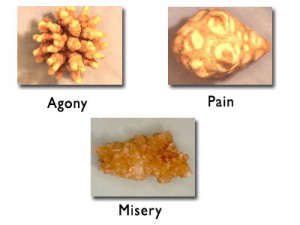 A kidney stone is a hard mass developed from crystals that separate from the urine within the urinary tract. Normally, urine contains chemicals that prevent or inhibit the crystals from forming. These inhibitors do not seem to work for everyone, however, so some people form stones. If the crystals remain tiny enough, they will travel through the urinary tract and pass out of the body in the urine without being noticed.
A kidney stone is a hard mass developed from crystals that separate from the urine within the urinary tract. Normally, urine contains chemicals that prevent or inhibit the crystals from forming. These inhibitors do not seem to work for everyone, however, so some people form stones. If the crystals remain tiny enough, they will travel through the urinary tract and pass out of the body in the urine without being noticed.
Kidney stones may contain various combinations of chemicals. The most common type of stone contains calcium in combination with either oxalate or phosphate. These chemicals are part of a person’s normal diet and make up important parts of the body, such as bones and muscles.
What are the symptoms of a kidney stone?
The symptoms of a kidney stone problem include:
- extreme pain in your back or side that will not go away
- blood in your urine
- fever and chills
- vomiting
- urine that smells bad or looks cloudy
- a burning feeling when you urinate
What can my doctor do about a problem stone?
Most kidney stones pass out of the body without any intervention by a physician. Drinking plenty of water—2 to 3 quarts a day—can help move the stone along.
Stones that cause lasting symptoms or other complications may be treated by various techniques, most of which do not involve major surgery. Also, research advances have led to a better understanding of the many factors that promote stone formation and thus better treatments for preventing stones.
Extracorporeal shock wave lithotripsy (ESWL) is the most frequently used procedure for the treatment of kidney stones. In ESWL, shock waves that are created outside the body travel through the skin and body tissues until they hit the denser stones. The stones break down into small particles and are easily passed through the urinary tract in the urine.
Sometimes a stone is removed through “tunnel surgery.” The surgeon makes a small cut in the back and creates a narrow tunnel into the kidney. The surgeon then locates and removes the stone using a special instrument.
If the stone is in the ureter—the tube that carries urine from the kidney to the bladder—the doctor may use a ureteroscope. This slender instrument is inserted into the urethra—the short tube that carries urine out of the bladder when you urinate—through the bladder, then into the ureter. The doctor will catch the stone with a small cage in the uteroscope and pull it out. Or the doctor may shatter the stone with a device inserted through the ureteroscope.
For more information, click here to go to the Resounding Health Casebook on the topic.
Here’s Phil’s performance from Wednesday night. What do you think? Could he be the next American Idol?



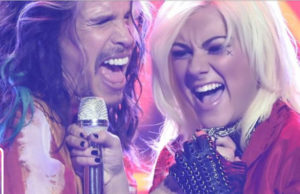

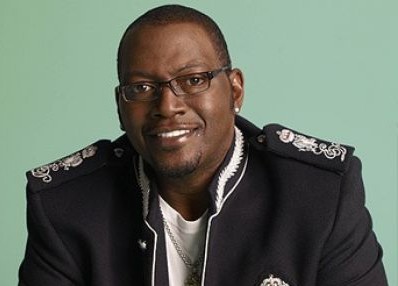

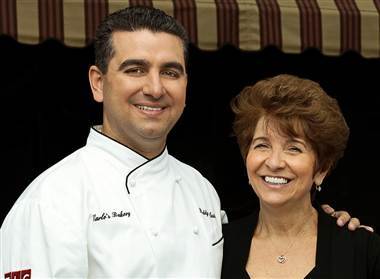










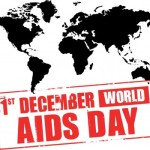








3 Comments